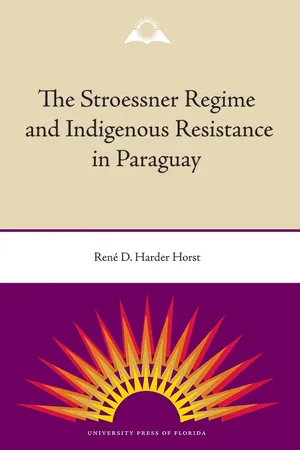
- 237 pages
- English
- PDF
- Available on iOS & Android
The Stroessner Regime and Indigenous Resistance in Paraguay
About this book
"Engaged, nuanced, and accessible--this untold story of Paraguay's indigenous peoples constitutes an important addition to the English-language literature on this understudied country."--John Charles Chasteen, University of North Carolina, Chapel Hill
"Provides original insights into the makings of indigenous policy during Paraguay's Stroessner era and the democratic opening after 1989 . . . shows how state policies were buffeted by external actors but also how indigenous peoples fought back. A must-read for those interested in indigenous policy in Latin America."-- Erick D. Langer, Georgetown University
"A significant contribution to the field . . . It develops a rich understanding of continuities and change in Paraguayan history, including the role of religious missions in indigenous assimilation and/or cultural preservation."--Virginia Garrard Burnett, University of Texas, Austin
Native groups have played an important historical role in Paraguay, the most homogenous and the only officially bilingual country in Latin America. This book analyzes their complex relationship with the corrupt Alfredo Stroessner regime (1954-89), which framed its policies as inclusive but excluded Paraguay's indigenous people from the benefits of national development and the most basic human rights. However, this is not a history of oppression and victimhood but rather a study in manipulation. Horst argues that while native people struggled daily to secure food and work under Stroessner's often contradictory and heavy-handed policies, they refused to disappear anonymously into the larger peasant population. As savvy actors who manipulated difficult circumstances to foil exclusionary policies, they succeeded in publicly embarrassing the regime as often as possible through exposures of state corruption.
Working in close cooperation with the Catholic Church, indigenous peoples capitalized on Catholic legal advocacy in their struggles to defend their territories and resources. The church became the strongest defender of native land claims, drawing international attention to the plight of indigenous peoples as well as abuses of human rights. While indigenous resistance weakened support for the Stroessner regime, it also drove native leaders and peoples into closer interaction with and dependency upon the very national institutions they opposed.
Contributing their own vision of a multiethnic state, the native people of Paraguay created multiple alliances with regime opponents, found ways to draw attention to human rights, and by demanding tolerance of ethnic plurality helped lead the nation toward greater democracy in 1992. Horst's study--the only history to focus on recent social policies and national political strategies for indigenous populations in modern Paraguay-- provides an important narrative for historians of Paraguay and other parts of Latin America, as well as for anthropologists and others interested in the intersection of identity politics and human rights.
René Harder Horst is associate professor of history at Appalachian State University.
Frequently asked questions
- Essential is ideal for learners and professionals who enjoy exploring a wide range of subjects. Access the Essential Library with 800,000+ trusted titles and best-sellers across business, personal growth, and the humanities. Includes unlimited reading time and Standard Read Aloud voice.
- Complete: Perfect for advanced learners and researchers needing full, unrestricted access. Unlock 1.4M+ books across hundreds of subjects, including academic and specialized titles. The Complete Plan also includes advanced features like Premium Read Aloud and Research Assistant.
Please note we cannot support devices running on iOS 13 and Android 7 or earlier. Learn more about using the app.
Information
Table of contents
- Cover
- Title
- Copyright
- Dedication
- Contents
- Acknowledgments
- List of Abbreviations
- 1. Introduction
- 2. A Racially Mixed Nation and an Authoritarian Political Culture
- 3. A State Policy of Integration, 1958–1966
- 4. Integration Turns to Exclusion, 1967–1976
- 5. The Indigenous Response to Exclusion, 1976–1987
- 6. Indigenous Mobilization and Democracy in Paraguay, 1988–1992
- 7. Conclusion: Everyday Forms of Exclusion
- Appendix. Paraguayan Newspaper Sources
- Notes
- Bibliography
- Index